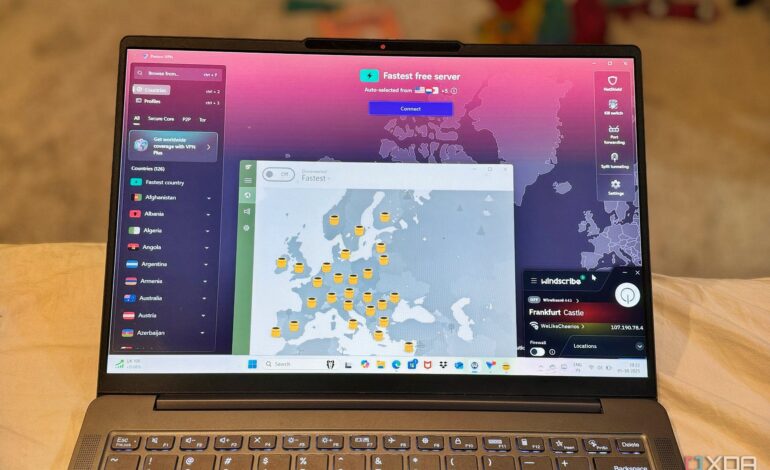Unlocking Productivity: How Free VPNs Enhance Workflows

Free virtual private networks (VPNs) are often viewed through a narrow lens: either as dubious services that harvest user data or as slow alternatives to premium offerings. Yet, a growing number of users are discovering their potential as productivity tools that extend beyond mere privacy. This exploration reveals how free VPNs like ProtonVPN, Windscribe, and TunnelBear can enhance workflows by providing unique benefits such as regional pricing insights and diverse search results.
Revealing Pricing Disparities Across Regions
One of the most compelling advantages of using a free VPN is its ability to expose significant regional pricing differences for software subscriptions. A user recently connected to servers outside Canada and discovered stark contrasts in subscription costs. For instance, while Canva Pro is priced at $15/month in the United States, it costs only ₹499/month (approximately $6.06 USD) in India. Similarly, Spotify’s Premium plan is available for $11.99/month in the US compared to just ₹139/month (approximately $1.46 USD) in India.
These variations are not mere glitches but rather reflect deliberate regional pricing strategies employed by software-as-a-service (SaaS) companies. Many do not verify billing addresses against browsing locations during sign-up. This oversight allows savvy users to potentially save hundreds of dollars annually by signing up for services through VPNs. For example, ProtonVPN’s free plan offers access to servers in the US, the Netherlands, and Japan, while Windscribe provides 10GB of monthly data across ten locations, enabling effective pricing comparisons.
Enhancing Research with Diverse Perspectives
In the realm of productivity writing, fresh insights are crucial. Search engines often restrict results based on location, leading to a phenomenon known as the “filter bubble.” This can hinder the discovery of innovative tools and ideas. By utilizing a free VPN with higher data limits, such as Windscribe, users can significantly alter search results by connecting to servers in different countries.
For example, a search for “best productivity apps 2025” from a North American server yields familiar names like Todoist and Trello. In contrast, switching to a server in Germany reveals options like Zoho Projects and MeisterTask, tools that may be more popular in Europe but underrepresented in US-centric discussions. This method allows users to employ VPNs strategically for research purposes, transforming the way they gather information.
While free VPNs may experience slower speeds—often taking two to three times longer to load results—this delay is manageable for text-based research. For serious research sessions, users can leverage TunnelBear’s data cap of 2GB to maximize efficiency without compromising their workflow.
Testing Work from an International Perspective
For online business owners and content creators, ensuring that web work appears correctly across different regions is essential. By using free VPNs, users can test how their websites function for international audiences. A notable example involved a client whose landing page displayed incorrectly for visitors from the European Union due to compliance with GDPR cookie regulations. This discrepancy highlighted the necessity of testing content globally to prevent user frustration.
Regularly using free VPN services allows creators to identify issues that may not surface during standard testing. For instance, certain resources might fail to load properly in specific regions, or payment processors might not function outside the user’s home country. ProtonVPN’s servers in the US, the Netherlands, and Japan provide valuable insights without the need for costly geographic testing services.
Furthermore, encountering issues with embedded content, such as a Calendly widget that did not load for European visitors, underscores the importance of cross-regional testing.
Navigating Workplace Restrictions
Workplace restrictions on internet usage can be frustrating, particularly when productivity tools are inadvertently blocked. While social media restrictions are common, some companies extend filtering to useful applications like Notion and Google services. While many organizations have policies against VPN usage, others may not have explicitly defined rules, allowing employees to use these tools for legitimate purposes.
In navigating these waters, open communication with the IT department is crucial. Explaining the necessity of accessing blocked tools can lead to positive outcomes. In one instance, a user received permission to use Windscribe on their work laptop, effectively bypassing unnecessary bureaucratic delays.
It is important to acknowledge that while free VPNs offer numerous benefits, they often come with trade-offs. Most free services log user data and may sell anonymized usage patterns to third parties. For casual access to productivity tools, this risk may be acceptable, but for sensitive tasks involving customer data, caution is advised. ProtonVPN stands out for its transparent logging policies compared to many free alternatives.
Conclusion: A Strategic Addition to the Toolkit
After months of utilizing free VPNs like ProtonVPN, Windscribe, and TunnelBear as productivity enhancers, users must recognize their limitations. Speed is a significant factor, as free servers often experience crowding and throttling, operating at only 40-60% of normal internet speeds. Data caps also constrain usage, with TunnelBear offering just 2GB monthly and Windscribe providing 10GB, while ProtonVPN allows unlimited data but restricts server access.
Ultimately, these services serve best as occasional tools for specific tasks where location manipulation can yield substantial workflow enhancements. While they are not suitable for everyday browsing or security needs, they are invaluable for identifying pricing opportunities, breaking out of content bubbles, and testing international user experiences. In this context, free VPNs have carved out a significant niche in the productivity toolkit for individuals navigating the complexities of digital workflows.






